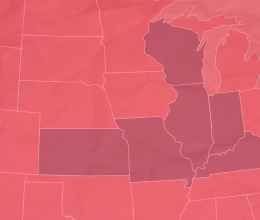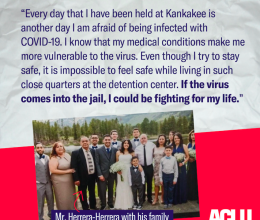By Patrice Bugelas-Brandt, Communications Department Volunteer
He was 23, in a San Francisco prison for defying a federal order, and had gone so far as to change his name and undergo minor plastic surgery to avoid arrest. In 1942, most would call the young man’s actions, at best, imprudent; at worst, suspicious and disloyal. Few would consider him a brave patriot. The country was at war and citizens wrapped themselves in a cloud of apprehension that measured civic duty and loyalty through obedience. Few supported the imprisoned shipyard worker, Fred Korematsu, or condoned his refusal to report, as ordered, to his assigned “Assembly Center” in Oakland where the federal government was rounding up Japanese Americans for relocation out of west coast states.
Ernest Besig, then Director of the ACLU-Northern California saw Korematsu’s defiance differently. He understood the Japanese Americans’ dilemma. Though there had been absolutely no evidence that these citizens held allegiance to any nation but the United States, they could only “prove” their loyalty by reporting, as ordered, to the Assembly Centers. Besig would later be quoted that he found the government orders “the most shocking examples of a Government abusing the rights of citizens.” So, within days of hearing about Fred Korematsu’s arrest, Besig visited the seemingly “imprudent” Korematsu in prison and recognized his bravery.
For the next 30 months Korematsu, civil right lawyer Wayne M. Collins, and the ACLU challenged the federal government’s case. Though Fred was able to post his $5,000 bond (equal to about $71,500 today) he was immediately re-arrested by U.S. Military Police and confined in the Presidio military base throughout his trial. When he lost his case in court, Fred was sent to the Central Utah War Relocation Center in Topaz, Utah as he filed his court appeals. In March of 1944, the U.S. Supreme Court agreed to hear Korematsu’s case and that of Mitsuye Endo, who had challenged the government’s right to indefinitely hold her in a Japanese American relocation camp. On December 18, 1944, the Court ruled on both cases finding on behalf of Ms. Endo, stating that the government could not continue to detain a citizen the government itself conceded was loyal. However, the Court upheld Fred Korematsu’s conviction and dismissed his argument that the government had no legal basis to force his relocation. The Court found that “compulsory exclusion, though constitutionally suspect, is justified during emergency and peril.” The seemingly contradictory rulings, as one observer explained, meant that the government could criminally punish someone for refusing to be illegally imprisoned.
It would take almost another 40 years, but in 1983 a federal court vacated Korematsu’s conviction after evidence was discovered that in 1944 the U.S. Solicitor General had intentionally withheld FBI and military intelligence reports from the Court; reports which clearly stated that there was no evidence that Japanese Americans posed a threat to their country. The Supreme Court’s decision, however, was not overturned.
By the time Fred Korematsu died in 2005, the U.S. government had acknowledged that the World War II internment program had been based on “racism and hysteria.” President Reagan had signed a law, nationally apologizing to the surviving Japanese Americans who had endured the camps and issued them each $20,000 in compensation. In 1998, President Clinton honored Fred Korematsu with the Presidential Medal of Freedom.
On this January 30, the 95 anniversary of his birth, Illinois joins a growing number of states in honoring Fred Korematsu establishing an annual day of recognition. Addressing the federal court in 1983, Korematsu explained his 1942 decision to defy the government’s orders and his life-long struggle to expose the egregious actions taken against Japanese Americans. It was, he explained “to see the government admit that they were wrong and to do something about it so that this will never happen again to any American citizen of any race, creed or color.”
Fred Korematsu: a brave American patriot.




